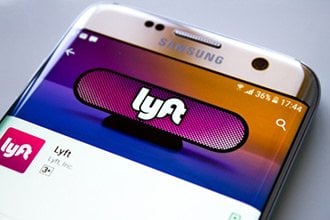
The Lyft IPO will be the first major public offering of 2019. But despite all the hype this IPO is receiving, we think it's best for retail investors to sit this one out...
There's no denying ride-sharing services' growing popularity. It's an innovative business model that has practically usurped the taxi industry. Beyond that, it's created a new side hustle for anyone wanting to work in a gig economy.
Many companies have popped up as a result of this industry's rise. Uber and Lyft are the biggest, but there's also competition from less popular ones, like Via and Gett.
Fortunately for Lyft, Uber has been dealing with the fallout from CEO Travis Kalanick's resignation in 2017.
They've even taken advantage of the #DeleteUber movement - marketing themselves as the friendlier company.
In 2018, Lyft saw $2.2 billion in revenue - double the $1.1 million they made in 2017. And it's partly thanks to the drama surrounding Uber.
Beyond that, Lyft claims the ride-sharing market grew 39% in 2018 - with 1.1 million drivers and 18.6 million Lyft riders (both in the United States and Canada).
However, the company still faces stiff competition from Uber. But Lyft sees itself as a vanguard of a societal shift - reporting 22% of its riders are driving much less because of the company.
It's even gone as far as predicting drops in car ownership as transportation-as-a-service (TaaS) continues to grow.
IPO Explosion: Average people have made tens of millions of dollars from cannabis IPOs - here's how you can become one of them...
In a race against Uber, Lyft announced its shares will be priced near $65. And according to TechCrunch, it's looking to sell 31 million shares.
If the Lyft IPO does well, the company says stock purchases will raise a little over $2 billion - bumping its worth to $23 billion within the first day of trading.
But that's not the full story of Lyft...
While Wall Street's investors are hyping up the Lyft IPO, it's hard to ignore some of the red flags.
Red Flags Are Hiding in Lyft's Balance Sheet
[mmpazkzone name="in-story" network="9794" site="307044" id="137008" type="4"]
A closer look at the numbers tells us the Lyft IPO isn't a sound long-term investment. Even Money Morning's Tim Melvin, who's no stranger to Lyft's services, can't justify any hype surrounding the Lyft IPO.
Go through the documents, and you'll see $2.2 billion in revenue. But you'll also see a glaring $911 million loss. That's the first reason to avoid this IPO.
Some Wall Street analysts rationalize this loss stems from research and development (R&D). But that's just not the case with Lyft.
R&D accounts for only $300 million of its total losses. This means at least $600 million was spent on operations - including its acquisition of Motivate in mid-2018.
And sure, Lyft's ride-sharing prediction sounds wonderful. But Tim Melvin thinks it's greatly underestimating America's love for cars. That's the second reason we recommend avoiding Lyft stock.
Still, there is some validity in the company's view of the future. It certainly may be the case for urban areas like NYC.
As for the rest of North America, I don't see many people giving up their personal vehicles anytime soon.
Much like Tim Melvin, my first experience with a ride-sharing app was in Chicago in 2018.
I had never used one before, but a friend wanted to show me the city and insisted we take an Uber for a night out on Michigan Avenue.
I could see why it was so popular. You didn't have to worry about parking or navigating the city. Beyond that, I could see how a ride-sharing app could be a game-changer for cutting down on DUIs.
Honestly, I think ride-sharing services are great. They may even become the standard for transportation.
However, Money Morning cannot recommend a company with negative stockholder equity - especially when you look at the competition (whose valuation is $100 billion higher).
And that's what the balance sheet tells us about Lyft.
The Lyft IPO Isn't All It's Cracked Up to Be
Lyft's vision is commendable. Inspiring, even. However, its road to profitability is muddy at best.
If you buy into the Lyft IPO on March 29, there are a few things you should know.
Lyft revealed huge losses in 2018 and emphasized the company may never be profitable.
Aside from that, Lyft's founders all have super-voting B shares - giving them twenty votes each. In comparison, early shareholders will have one per share. That's our third reason for avoiding this IPO.
This means they have complete say in everything the company does. So strap up and watch, since you'll just be along for the ride.
Lyft's grand vision has Wall Street hyped up on emotion. But if you've been following along with Money Morning, you know facts and patience are the better bet.
And the facts reinforce that Lyft is a bad investment.
At least for now.
If things pan out their way, then there will certainly be more opportunities to take action. However, cash flow is what matters.
Ride-sharing services are still great and convenient. And their role in lowering DUIs and accidents shouldn't be understated.
But for now, Lyft isn't profitable.
As for those interested in new IPOs, we have a few investments that could net you massive returns.
These New IPOs Could Create a Surge of New Millionaires
Cannabis is taking the market by storm and we're about to see a huge spike in new IPOs. And smart day-one investors stand to make massive profits.
Over the next few weeks, upwards of 10 private cannabis companies could go public. Beyond that, the four biggest ones to watch are expected to generate record-setting numbers.
They're predicted to make anywhere from $500 million to $3 billion within the first day of their IPOs.
Meaning investors stand to make roughly $12 billion within the year.
So don't miss out. Get in on the action by clicking here.
Follow Money Morning on Facebook and Twitter.
About the Author
Daniel Smoot is a Baltimore-based editor who helps everyday investors with stock recommendations and analysis. He regularly writes about initial public offerings, technology, and more. He earned a Bachelor's degree from Towson University.



